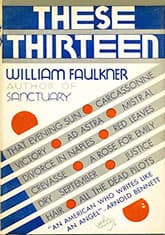A Rose for Emily
CRITIQUE | THE TEXT
 First edition of collection, 1931
First edition of collection, 1931First publication
1930, in magazine Forum
First book publication
1931, in collection These Thirteen
Literature form
Story
Genre
Literary
Writing language
English
Author's country
United States
Length
Approx. 2,900 words
Notable lines
WHEN Miss Emily Grierson died, our whole town went to her funeral: the men through a sort of respectful affection for a fallen monument, the women mostly out of curiosity to see the inside of her house, which no one save an old man-servant—a combined gardener and cook—had seen in at least ten years.
— First line
Alive, Miss Emily had been a tradition, a duty, and a care; a sort of hereditary obligation upon the town, dating from that day in 1894 when Colonel Sartoris, the mayor—he who fathered the edict that no Negro woman should appear on the streets without an apron—remitted her taxes, the dispensation dating from the death of her father on into perpetuity.
It smelled of dust and disuse—a close, dank smell. The Negro led them into the parlor. It was furnished in heavy, leather-covered furniture. When the Negro opened the blinds of one window, they could see that the leather was cracked; and when they sat down, a faint dust rose sluggishly about their thighs, spinning with slow motes in the single sun-ray. On a tarnished gilt easel before the fireplace stood a crayon portrait of Miss Emily's father.
"Just as if a man—any man—could keep a kitchen properly," the ladies said; so they were not surprised when the smell developed. It was another link between the gross, teeming world and the high and mighty Griersons.
"I want arsenic."
The druggist looked down at her. She looked back at him, erect, her face like a strained flag. "Why, of course," the druggist said. "If that's what you want. But the law requires you to tell what you are going to use it for."
Miss Emily just stared at him, her head tilted back in order to look him eye for eye, until he looked away and went and got the arsenic and wrapped it up. The Negro delivery boy brought her the package; the druggist didn't come back. When she opened the package at home there was written on the box, under the skull and bones: "For rats."
They held the funeral on the second day, with the town coming to look at Miss Emily beneath a mass of bought flowers with the crayon face of her father musing profoundly above the bier and the ladies sibilant and macabre; and the very old men—some in their brushed Confederate uniforms—on the porch and the lawn, talking of Miss Emily as if she had been a contemporary of theirs, believing that they had danced with her and courted her perhaps, confusing time with its mathematical progression, as the old do, to whom all the past is not a diminishing road but, instead, a huge meadow which no winter ever quite touches, divided from them now by the narrow bottle-neck of the most recent decade of years.
One of us lifted something from it, and leaning forward, that faint and invisible dust dry and acrid in the nostrils, we saw a long strand of iron-gray hair.
— Last line.
CRITIQUE | THE TEXT


